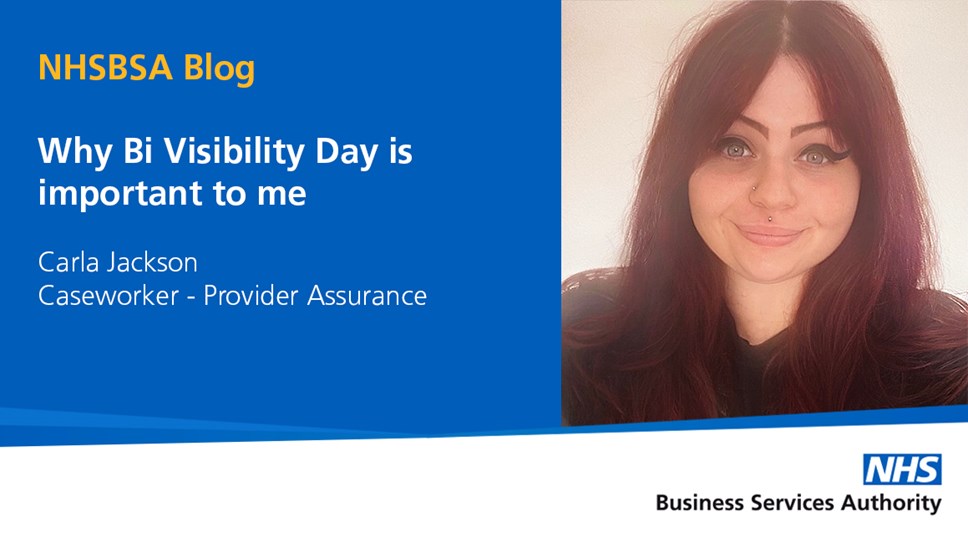
Why Bi Visibility Day is Important to Me
23rd September marks Bi Visibility Day, a day to celebrate the bisexual community as part of the LGBTQ+ umbrella and to raise awareness of the challenges they face.
Today, Carla Jackson, blogs about the importance of celebrating Bi Visibility Day and her experiences as part of the LGBTQ+ community.
My name is Carla Jackson, I work for the Pharmaceutical Services team in Provider Assurance, and I am also a member of the LGBTQ+ Colleague Network.
The aim of today is to provide a platform to the bisexual community and their allies, and to bring widespread attention to the social, economic, and cultural challenges faced by bisexual people.
A lot of people that are unfamiliar with bisexual experiences, or perhaps don’t have ties to the LGBTQ+ community may be wondering, why do we need a Bi Visibility Day? I thought it was a lot more talked about and accepted nowadays?
With the theme of visibility in mind, I want to attempt to bring to light some of the common experiences bisexual people face on a regular basis in relation, and touch on biphobia and bi erasure, whilst also drawing upon my own experiences.
I’ve found one experience that is unique to bisexual people is the coming out stage. When people started to find out about my sexuality, my hopes were high as the early 2010s was a time where people coming out as gay or lesbian was becoming more common and accepted and garnering more positive responses.
However, myself and many other bi people are met with phrases such as “it’s just a phase, you’ll grow out of it” or “you’re gay and haven’t realised it yet” or “you’re just confused”. As a result, I’ve often felt a lot more confusion in my identity and a lesser sense of community as I don’t fall into the gay/straight binary. There is also an expectation to be exactly 50:50 in terms of our attractions to “qualify” as being bisexual. When our identity does not fit into these very narrow criteria, it puzzles us even further and pressurises us to “just choose a side”.
Being open about our relationships is also difficult, as we’re often assumed to be straight when we’re in a relationship with someone of the opposite sex, or gay when we’re in a relationship with someone of the same sex. I often felt rejected from straight people for not being “straight enough”, whilst simultaneously being rejected from the gay community for not being “gay enough”.
On a more personal level, I’ve often been rejected romantically from men on the assumption that I’ll be unfaithful, or rejected from women because they don’t want to be with someone who has previously had relationships with men. I’ve had well-meaning friends make jokes and say that I’m “greedy” or “can’t make up my mind” and “everyone seems to be bi nowadays”.
As a lover of movies and literature, I often turned to the fictional world for inspiration and for role models that I could identify with, that I wasn’t finding in the real world. Whilst gay and lesbian people seemed to have amazing role models they could look up to like Neil Patrick Harris and Ellen DeGeneres, I struggled to find visible bi role models in the public eye as their sexuality was often not talked about or were just assumed to be either gay or straight depending on their image. In a lot of cases, this only reinforces bi erasure and amplifies our feelings of shame, as we don’t fit into the very narrow moulds of gay and straight that society has made for us.
Similarly, in the past, many famous bisexual people were never given to chance to be role models as their sexuality was brushed under the rug or simply passed off as “just gay”. One of my personal idols is Freddie Mercury, which makes his experience of bi erasure hit home even more. To this day, an overwhelming percentage of media still portray him as gay despite the fact he was openly bisexual, never formally came out as gay and had relationships with both men and women.
However, the case for bisexuality is slowly improving. Today, young people feeling confused in their sexuality have people like Lady Gaga, Harry Styles and Kristen Stewart to look up to and gain inspiration from. They have bisexual character being shown more and more in TV and movies, such as Mazikeen in Lucifer, Oberyn Martell in Game Of Thrones, Rana Habeeb in Coronation Street and Adam Groff in Sex Education, to name a few.
Biphobic misconceptions are one of the main reasons that 2 in 5 people who identify as bisexual are not “out” in the workplace or to any of their colleagues. In the face of this, the NHSBSA aims to be completely accepting and supportive of bi colleagues to let them be their most authentic selves in the workplace and help them flourish.
I hope that in sharing this blog post with you all, there may be someone who can see themselves in what I’ve written and feels as though they can be themselves at the NHSBSA going forward. I really am proud to be part of an organisation that takes pride in highlighting bisexual acceptance and positivity and bringing visibility to the bi community that many of our colleagues are part of.
